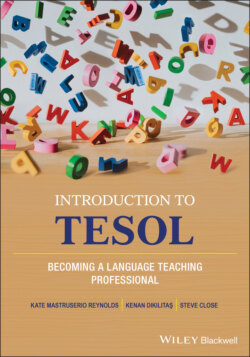Читать книгу Introduction to TESOL - Kate Reynolds - Страница 49
Work at private language schools
ОглавлениеPrivate language schools are schools owned and operated by private individuals or corporations. There are private language schools in virtually all countries, with both EFL and ESL settings. They range in size from small family-owned businesses to large, widely known corporations, such as Berlitz. They are outside of the public school system and, therefore, do not have to comply with the same governmental regulations as public schools.
Many students enroll in private language schools for study after work or school hours. Their study at the private language school gives more instruction to extend learners’ proficiency level and build their confidence. Courses tend to be focused on students’ goals and needs. For example, adult students may study intensively to improve their proficiency score on the International English Language Testing System (IELTS) exam (https://www.ielts.org/en-us), so they may be promoted at work or obtain a new position. Classes tend to be smaller with interaction in speaking, listening, reading, and writing in English as the focus of instruction; however, grammar and vocabulary will also play a role.
Private language schools require different types of qualifications. It is difficult to provide a rule of thumb for the types of qualifications because, depending on the size and quality of the private language school, expectations vary. Some small private language schools may not require any specific qualification. On the other hand, we know of excellent small, family-owned private language schools that require a bachelors’ degree and a TEFL certificate, whereas others may only require a bachelors’ degree. Large private language schools will most likely require a bachelors’ degree and a TEFL certificate or CELTA at the minimum.
TEFL certificates may be obtained through private language schools, who will then employ their graduates, online or from universities. The quality of these TEFL certificates can normally be determined from the duration of the TEFL certificate program and the reputation of the organization. Many online TEFL certificates offer a course of study over 120 hr of instruction. Universities tend to have courses of study with approximately 30–50 semester credits or 90–150 hr of instruction, but the courses are more rigorous.
Newcomers to the field need to be aware of two potentially problematic areas of working with private language schools. First, small, private language schools may not be established, long-standing institutions. They may have operational challenges that employees might experience. The treatment employees may receive may not align with their expectations. For example, many colleagues have reported being asked to go on a “visa run,” which is a round trip outside of the country, so that they can continue to work while holding a tourist visa. By doing so, the private language school does not have to help their educators obtain a work permit/visa. Promises made may not always be kept. It is important to research prior to accepting a position. Second, it has been reported that some of the job postings for private language schools are fraudulent and are designed to obtain the applicant’s name, social security number/personal identification number, passport number, passport image, and/or money. TESOL educators need to ensure that the school that they are considering is a legitimate business and must be cautious about sharing personal information or sending money to a school.
